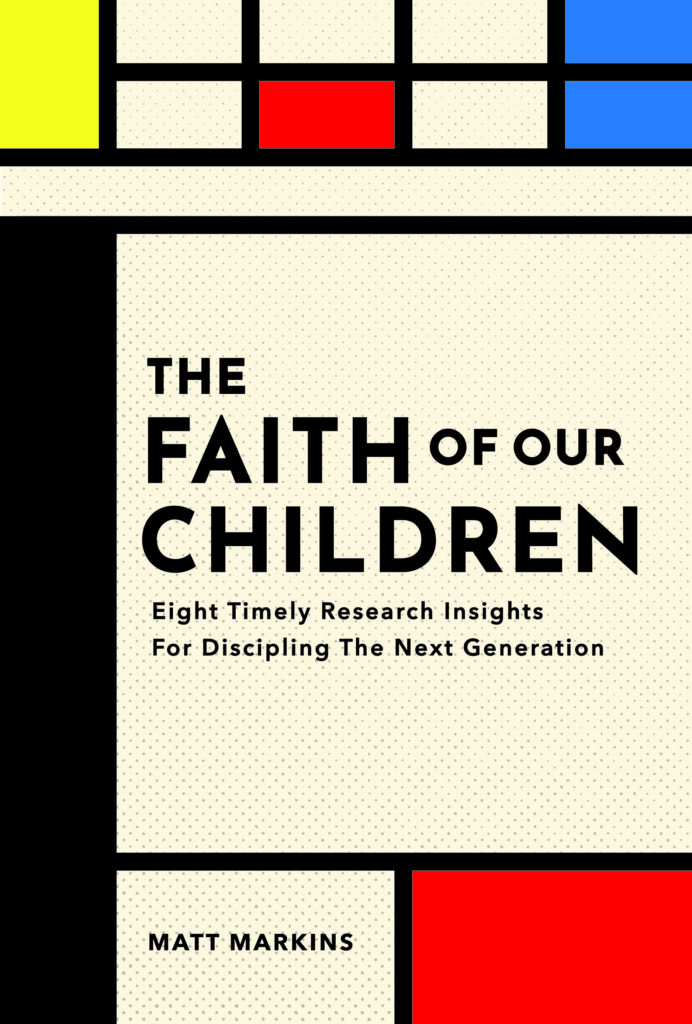Formation
The Primary Investments That Tend to Form Lasting Faith in Children
Chapter 1 - Goal
Lasting Faith is the Desired Outcome
Discussion Questions
- Thinking of “forming lasting faith in children,” read Revelation 7:9–12.
As you imagine being a part of this future, biblical scene, when you look to the right and the left, what faces do you see? Name the people who mean the most to you whom you long to “be there.” What children, who are now in your life, do you want to see grow up with a lasting faith to join you and the Kingdom of God in Revelation 7? - As discussed in this chapter, at the highest and most conceptual level, child discipleship is a joint effort of us participating with God with the motivation of forming children in the image of God. What are one or two things you do that you think have the most significant impact on discipling kids? Why do you think that is? What would it look like to do less of the things that have little impact and more of the things that have the highest impact?
- In this chapter, we discussed the 3B definition of what forms a child disciple: Belong (relationships), Believe (Scripture engagement), and Become (experiences). Do these three primary factors resonate with your own personal experience and study? If yes, discuss why. Are there other key factors you think I missed? If so, what are they?
Chapter 2- Relationships
The Most Catalytic Factor in Forming Lasting Faith in Children
The Faith of our Children Chapter 2 Video
Discussion Questions
- When you think about your own discipleship journey, was there a key person who was catalytic to your spiritual journey?
- With the kids in your personal life (children, grandchildren, nieces, nephews, kids you mentor, etc.), how would you rate your relational connection with them? Do these kids feel a sense of belonging with you? Do they know they can talk with you about anything and that you will love them unconditionally?
- Would you say your church community is highly relational with children? Is your church a place where kids feel seen, known, and have a feeling of belonging?
- If a church community were Scripture-rich and really good at Bible teaching, but not so good at making kids feel a sense of relational belonging, what do you think would be the potential down-side of that church community?
- As a parent or a child-influencer, what one thing can you do to become more fruitful at relational connection with kids for the sake of the gospel? As a church leader or church volunteer, what one thing can you do to become more fruitful at relational connection with kids for the sake of the gospel?
Chapter 3 - Bible Engagement
The Most Foundational Factor in Forming Lasting Faith in Children
The Faith of our Children Chapter 3 Video
Discussion Questions
- How frequently do you personally engage the Bible? Consider sharing with one another different ways we engage the Bible, to encourage one another in this area of discipleship practice.
- Have we evaluated our curriculum through the lens of biblical rigor and appropriateness for children? Furthermore, does our curriculum make the gospel clear on a consistent basis?
- Do you think the kids in your church understand the “Creation, Fall, redemption, restoration” arch of the Bible? Do the older kids in your children’s ministry see this as “reality” and a better option than following the ways of the world?
- Are there ways where our church (intentionally or unintentionally) uses the Bible Lite Strategy?
- Is our ministry a Scripture-rich environment? If not, how can we improve?
Chapter 4 - Culture
Sometimes We Feel Like We’re Losing Because of Dominant Cultural Forces
The Faith of our Children Chapter 4 Video
Discussion Questions
- Cultural formation is no longer just something that’s “out there,” it’s also in our home communities. When you think about the aspects of secularism we’ve discussed in Chapters 3 and 4, how do you see cultural formation impacting children and families in your community? Which aspects do you think you need to name (as you see them shaping children and parents)?
- When you think three to five years down the road, which aspects of cultural formation (and how they might form children and families) give you the most concern
- As a church body (church leaders, parents, grandparents, and volunteers) are we adequately preparing kids to thrive in their faith in this not-so-distant future? If not, what might we need to do to begin thinking differently?
- For the sake of discussion, if we could temporarily set programs aside (like Sunday School, Large Group, Mid-Week, or VBS as an example), what objectives are the most important to shaping the faith of our children in the midst of our secular age? What if we then took those top three or four objectives and made sure that our programs (Sunday School, Large Group, Mid-Week, or VBS, etc.) were wired to achieve those objectives that are most known to shape lasting faith in children?
- What top two or three cultural challenges are parents facing as it relates to discipling children in the secular world? And how can we work church-wide (children’s ministry, youth ministry, senior pastor)to address these holistically?
